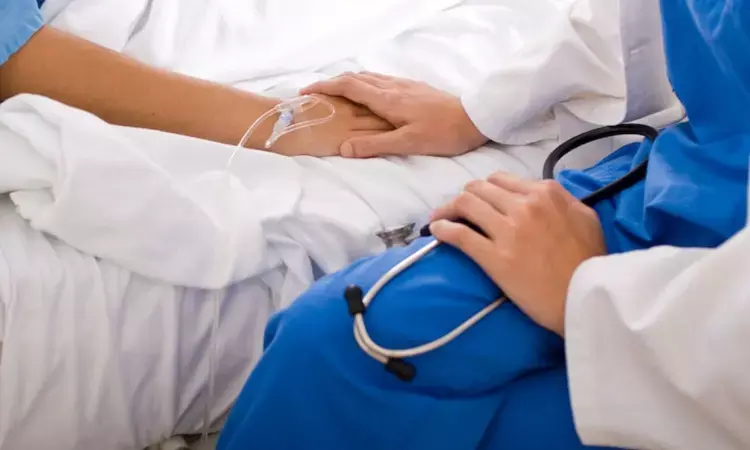- Home
- Medical news & Guidelines
- Anesthesiology
- Cardiology and CTVS
- Critical Care
- Dentistry
- Dermatology
- Diabetes and Endocrinology
- ENT
- Gastroenterology
- Medicine
- Nephrology
- Neurology
- Obstretics-Gynaecology
- Oncology
- Ophthalmology
- Orthopaedics
- Pediatrics-Neonatology
- Psychiatry
- Pulmonology
- Radiology
- Surgery
- Urology
- Laboratory Medicine
- Diet
- Nursing
- Paramedical
- Physiotherapy
- Health news
- Fact Check
- Bone Health Fact Check
- Brain Health Fact Check
- Cancer Related Fact Check
- Child Care Fact Check
- Dental and oral health fact check
- Diabetes and metabolic health fact check
- Diet and Nutrition Fact Check
- Eye and ENT Care Fact Check
- Fitness fact check
- Gut health fact check
- Heart health fact check
- Kidney health fact check
- Medical education fact check
- Men's health fact check
- Respiratory fact check
- Skin and hair care fact check
- Vaccine and Immunization fact check
- Women's health fact check
- AYUSH
- State News
- Andaman and Nicobar Islands
- Andhra Pradesh
- Arunachal Pradesh
- Assam
- Bihar
- Chandigarh
- Chattisgarh
- Dadra and Nagar Haveli
- Daman and Diu
- Delhi
- Goa
- Gujarat
- Haryana
- Himachal Pradesh
- Jammu & Kashmir
- Jharkhand
- Karnataka
- Kerala
- Ladakh
- Lakshadweep
- Madhya Pradesh
- Maharashtra
- Manipur
- Meghalaya
- Mizoram
- Nagaland
- Odisha
- Puducherry
- Punjab
- Rajasthan
- Sikkim
- Tamil Nadu
- Telangana
- Tripura
- Uttar Pradesh
- Uttrakhand
- West Bengal
- Medical Education
- Industry
Prevention of alcohol withdrawal syndrome in surgical ICU: AAST releases consensus

USA: The American Association for the Surgery of Trauma (AAST) Critical Care Committee has released a clinical consensus document on preventing alcohol withdrawal syndrome in the surgical ICU.
Alcohol withdrawal syndrome (AWS) is characterized by the physical symptoms following cessation of alcohol in patients with alcohol use disorder (AUD). It affects 8% to 40% of patients admitted to the surgical ICU and is tied to poor outcomes, including higher mortality and infectious complications. During the past several years, the focus of AWS management has shifted from a reactive treatment of the syndrome to proactively enacting prophylaxis. This change has led to abundant literature to help guide the screening, monitoring, and empiric prophylaxis of alcohol withdrawal.
In the document published in the BMJ journal Trauma Surgery & Acute Care Open, Anupamaa Seshadri from the Department of Surgery in Beth Israel Deaconess Medical Center, Boston, Massachusetts, USA, and colleagues provide practical guidance to the surgical intensivist on the best practices in screening and prophylaxis of patients at risk for alcohol withdrawal syndrome.
Screening Tools
- The authors recommend that patients be screened within 6 to 24 hours ofdiscontinuation of alcohol consumption. Blood alcohol level (BAL) can serve asan initial screen; however, subjective scoring systems (The Alcohol UseDisorders Identification Test (AUDIT), The Prediction of Alcohol WithdrawalSeverity Scale (PAWSS)) have higher sensitivity and specificity for the predictionof AWS.
- In theabsence of clear designation of which other services are necessary forscreening and intervention for patients at risk for alcohol withdrawal,multiple services as available in individual institutions can be considered forassistance in managing AWS. Social Work, Addiction Medicine, Psychiatry,Psychiatry Nursing, or Psychology can help standardize the implementation ofscreening and intervention.
Empiric Prophylaxis
- Empiricprophylaxis for alcohol withdrawal is beneficial and has decreasedcomplications from alcohol withdrawal for patients at risk for severe orcomplicated AWS.
- The current bestpractice is for critically ill patients admitted to a surgical ICU and deemedhigh risk for AWS based on objective criteria to receive empiric alcohol withdrawalprophylaxis.
- Inpatients at high risk for complicated alcohol withdrawal but do not otherwisemeet the criteria for SICU admission may be admitted to a monitored setting (SICUvs surgical stepdown) with telemetry and pulse oximetry capabilities to initiate alcohol withdrawal prophylaxis therapy.
Surveillance Methods
- The use of the modified Minnesota Detoxification Scale (mMINDS) is recommended forICU patients at risk for AWS.
Medications
- The authors recommendbenzodiazepines for the treatment of major symptoms of AWS and prophylaxis against the worsening of mild AWS. Recommended agents are diazepam,lorazepam, and chlordiazepoxide, to be used in a standardized administrationprotocol.
- Phenobarbital is a safe and effective pharmacologic agentfor use in the prevention and treatment of AWS. Due to the pharmacokinetics andlong half-life of phenobarbital, a fixed-dose approach is recommended.
- Clonidineand gabapentin arerecommended; intravenous ethanol and non-phenobarbital antiepilepticsare not currently recommended as they are not equivalent to benzodiazepines.Dexmedetomidine and propofol are recommended as benzodiazepine adjuncts.
Supplementation
- Micronutrientdeficiencies are common in those with chronic or severe AUD. Thiamine (vitaminB1), magnesium, phosphorus, and folic acid (vitamin B9) should be given assupplements during the acute period of critical care, even in the absence ofsymptoms of AWS.
Reference:
Seshadri A, Appelbaum R, Carmichael SP 2nd, Farrell MS, Filiberto DM, Jawa R, Kodadek L, Mandell S, Miles MVP, Paul J, Robinson B, Michetti CP. Prevention of alcohol withdrawal syndrome in the surgical ICU: an American Association for the Surgery of Trauma Critical Care Committee Clinical Consensus Document. Trauma Surg Acute Care Open. 2022 Nov 21;7(1):e001010. doi: 10.1136/tsaco-2022-001010. PMID: 36425749; PMCID: PMC9680182.
Dr Kamal Kant Kohli-MBBS, DTCD- a chest specialist with more than 30 years of practice and a flair for writing clinical articles, Dr Kamal Kant Kohli joined Medical Dialogues as a Chief Editor of Medical News. Besides writing articles, as an editor, he proofreads and verifies all the medical content published on Medical Dialogues including those coming from journals, studies,medical conferences,guidelines etc. Email: drkohli@medicaldialogues.in. Contact no. 011-43720751


